June 26, 2025 | 00:51 GMT +7
June 26, 2025 | 00:51 GMT +7
Hotline: 0913.378.918
June 26, 2025 | 00:51 GMT +7
Hotline: 0913.378.918
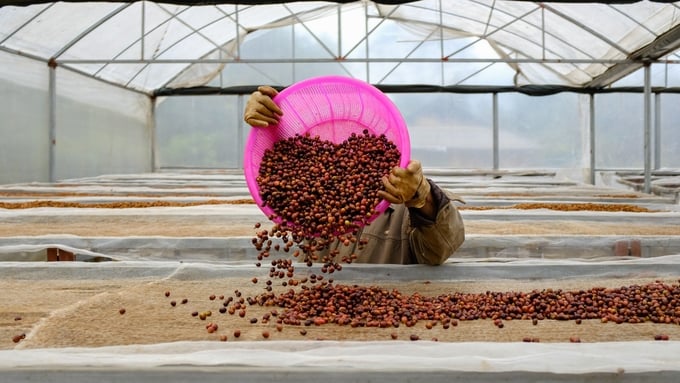
Coffee drying process in Son La province, Vietnam. Photo: GIZ/Kevin Leung.
The Delegation of the European Union to Vietnam collaborated with the Ministry of Agriculture and Rural Development to host a technical meeting on March 26, in Hanoi regarding the European Union's Regulation on Deforestation-free products (EUDR).
The meeting provided a platform for information sharing between key stakeholders, including Vietnamese government ministries and agencies, academic institutions, international organizations, representatives from the forestry sector, and business communities.
Moreover, the meeting contributed to enhancing the public's understanding of the EUDR, and served as an opportunity for stakeholders to discuss benefits, challenges, and provide feedback.
Furthermore, the meeting highlighted Vietnam's need to strengthen forest-friendly supply chains.
The meeting marks the beginning of a series of events and measures aimed at disseminating information to stakeholders in Vietnam who will be affected by the EUDR.
Accordingly, the meeting allows Vietnamese businesses and manufacturers to prepare for these new regulations.
In recognition of the global responsibility of citizens in its member states, the European Union enacted the EUDR to minimize the bloc's impact on deforestation and forest degradation worldwide.
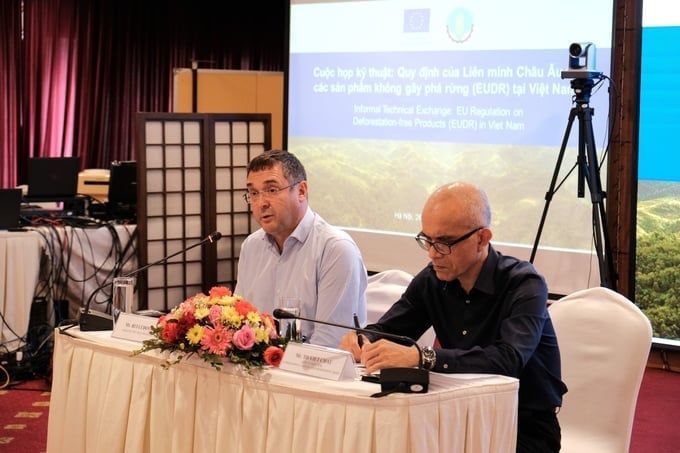
Two co-chairs of the meeting: Mr. Rui Ludovino, First Counsellor for Climate, Environment, Employment, and Social Affairs Policies, Delegation of the European Union to Vietnam (left), and Mr. To Viet Chau, Deputy Director of the International Cooperation Department, Ministry of Agriculture and Rural Development. Photo: GIZ/Phuong Thao.
Approximately 90% of global deforestation is linked to the expansion of agricultural activities, with the majority of this occurring in Southeast Asia. By promoting the consumption of "deforestation-free" products, the EU also contributes to achieving the Paris Agreement, SDGs, Leaders' Pledge for Nature (Glasgow Declaration), and the Global Biodiversity Framework.
Consequently, raising the demand and consumption of "deforestation-free" goods and products is the only practical approach to these goals.
According to Forest Trends, compliance with the EUDR reflects the shared concern of Vietnam and the EU. Namely, Vietnamese coffee, rubber, and timber products account for a significant portion of agricultural exports to the EU.
Notably, the EU market accounted for nearly 40% of Vietnam's coffee export value in 2022.
The European Union commends Vietnam's national plan to adapt to the EUDR. From the EU's perspective, all products covered by the EUDR and related to Vietnam's exports to the EU will benefit from government interventions to ensure legal and deforestation-free production, including requirements for geolocation and traceability.
During the meeting, Mr. To Viet Chau, Deputy Director of the International Cooperation Department at the Ministry of Agriculture and Rural Development, emphasized the Vietnamese government's commitment to preparing for the new EU Regulation.
"Despite significant challenges, the Ministry of Agriculture and Rural Development view compliance with this Regulation as a requirement for exporting coffee, rubber, timber, and wood products to the EU market, as well as an opportunity for the development of Vietnam's agricultural sector towards transparency, responsibility, sustainability, green growth, sustainable forest management and development, climate change resilience, and biodiversity conservation," Mr. Chau stated.
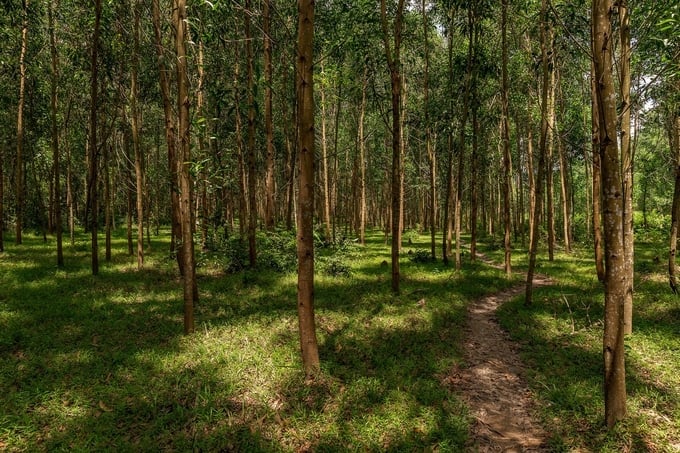
Planted forest in Binh Dinh province, Vietnam. Photo: GIZ/Binh Dang.
In order to comply with the EUDR, the Ministry of Agriculture and Rural Development has engaged in extensive discussions with technical agencies and leadership bodies under the European Commission. Additionally, the Ministry consulted with international organizations and specialized agencies to develop the Action Plan Framework to adapt to the EU Deforestation-Free Regulation. Accordingly, MARD proposed detailed tasks and solutions, and assigned them to specialized agencies.
According to the EUDR, companies exporting related products (livestock, cocoa, coffee, palm oil, natural rubber, soybeans, wood, and derivative products) to the EU market must ensure their accountability obligations.
This EU regulation imposes obligations on producers and traders who bring related products to the EU market or exporters within the EU. However, the regulation does not apply to countries, or producers in other countries.
To ensure a "deforestation-free" production process and maintain market access to the EU, producers in Vietnam have been prohibited from converting forests, as defined by FAO, into agricultural land since December 30, 2020. Furthermore, they are requested to focus on wood products that do not cause forest degradation.
Businesses must produce their items in compliance with relevant laws in Vietnam. They are also required to report the geographical coordinates of their production areas to buyers to maintain traceability along the supply chain.
The EU and its member states actively support the implementation of the EUDR on a global scale. Notably, the Team Europe Initiatives (TEI) provided technical assistance with a total funding of over 70 million euros. The EUDR took effect in June 2023 and will officially be enforced from December 30, 2024.
Mr. Rui Ludovino, First Counsellor for Climate, Environment, Employment, and Social Affairs Policies at the Delegation of the European Union to Vietnam, affirmed that the Delegation is actively cooperating with ministries, businesses, business associations, and non-governmental organizations in Vietnam to raise awareness and understanding of the EUDR among stakeholders, with businesses being the primary focus.
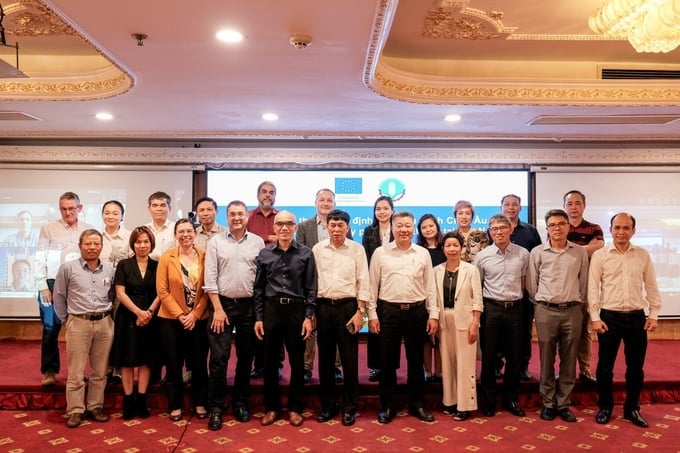
Participants of the meeting. Photo: GIZ/Pham Phuong Thao.
Overview of the Project for the enhanced implementation of EUDR
In 2023, the European Union, in collaboration with the Federal Ministry for Economic Cooperation and Development of Germany (BMZ), launched the project "Commitment to Indonesia, Malaysia, Laos, Thailand, and Vietnam to raise awareness and promote better understanding of the EU's approach to reduce deforestation and forest degradation caused by the EU (Enhanced Implementation of EUDR)."
The project aims to support EU delegations in Indonesia, Laos, Malaysia, Thailand, and Vietnam in enhancing understanding and reducing concerns regarding EUDR, with a focus on core elements, EU measures to foster a conducive environment for compliance, and opportunities brought by EUDR. The project operates in close collaboration with partners in Indonesia, Laos, Malaysia, Thailand, and Vietnam, as well as other programs and donors, in communication and dialogue surrounding EUDR.
Translated by Nguyen Hai Long
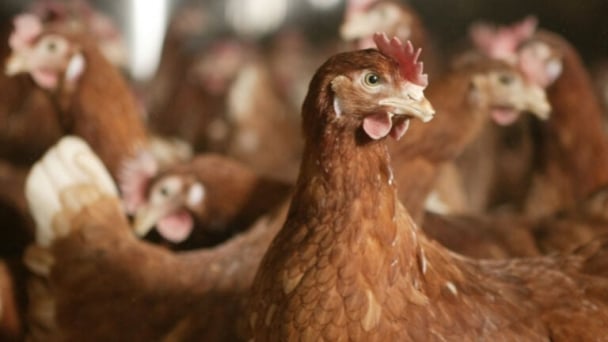
(VAN) Research has shown that Hy-Line brown hens may be better suited for cage-free production based on overall greater egg production and other quality metrics.
![Turning wind and rain into action: [9] Digitizing hydrometeorological data in response to climate change](https://t.ex-cdn.com/nongnghiepmoitruong.vn/608w/files/news/2025/06/17/z6704423696987_15fd32ffc26d590d204d520c9dac6786-nongnghiep-165943.jpg)
(VAN) Farmers have begun accessing hydrometeorological applications to adjust their cropping schedules, aiming to ensure productivity and adapt to climate change.
![Turning wind and rain into action: [8] Real-time salinity detection and early warning technology](https://t.ex-cdn.com/nongnghiepmoitruong.vn/608w/files/news/2025/06/17/z6704423696987_15fd32ffc26d590d204d520c9dac6786-nongnghiep-151127.jpg)
(VAN) Thanks to the integration of modern hydrological-hydraulic models, remote sensing technologies, and artificial intelligence, the accuracy of hydrological forecasting has significantly improved.
![Turning wind and rain into action: [7] Early disaster warnings help marine farmers minimize losses](https://t.ex-cdn.com/nongnghiepmoitruong.vn/608w/files/news/2025/06/17/z6704423696987_15fd32ffc26d590d204d520c9dac6786-nongnghiep-142942.jpg)
(VAN) In recent years, thanks to early disaster warnings and forecasting, marine farmers in Khanh Hoa province have been able to reduce risks and losses, thereby improving production efficiency.
![Turning wind and rain into action: [6] ‘Four on-the-spot’ disaster management software](https://t.ex-cdn.com/nongnghiepmoitruong.vn/608w/files/news/2025/06/17/e5a48259d6a262fc3bb3-nongnghiep-183800.jpg)
(VAN) By simply activating the scenario on the disaster management software, the relevant authorities immediately know how many households need to be evacuated, where to evacuate them to, and by what means of transportation…
![Turning wind and rain into action: [5] Hue applies modern technology in disaster forecasting](https://t.ex-cdn.com/nongnghiepmoitruong.vn/608w/files/news/2025/06/17/z6704423696987_15fd32ffc26d590d204d520c9dac6786-nongnghiep-093938.jpg)
(VAN) In Hue city, modern technology has recently been applied in meteorological and hydrological forecasting and warning, helping to reduce the damage caused by natural disasters.

(VAN) A cutting-edge farming technique being implemented on an experimental ranch in Arizona's Sonoran Desert has already saved a billion gallons of water over five years, according to Civil Eats.